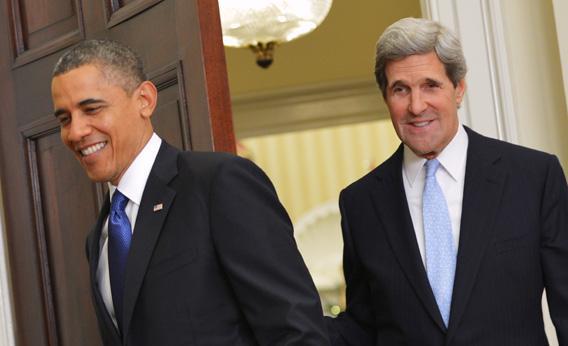John Kerry could be a great secretary of state. The question is whether President Obama wants him to be.
This administration puts a high premium on control. Foreign policy—much of domestic policy, too—is run from the White House, not Foggy Bottom or the other Cabinet departments. Hillary Clinton has been an excellent envoy in her four years on the job: a prodigious messenger (she traveled to more countries than any previous secretary of state) whose high profile and political talents have made her a credible, appealing face of America’s global reach. But no “Clinton doctrine” has emerged from her tenure. She tried to enunciate one in a “major policy addresses” on the primacy of people-to-people relations, especially women’s rights. Obama cited some of these points in a speech or two of his own, but they’ve had little traction in the world of real policy.
It’s possible, though, that Kerry could play a more assertive role, if not in setting Obama’s second-term agenda, then at least in drawing up the game plan on how to carry it out. Certainly he comes into the job with a tangible—and successful—record of doing just that.
During his first term, Obama called on him several times as a special emissary for difficult missions. Kerry persuaded Afghan President Hamid Karzai to hold a second-round run-off election, thus averting a major crisis in that country. Around the same time, he negotiated with Pakistan’s leaders on the release of an imprisoned American. Both efforts required bouts of shuttle diplomacy and, at each stop, a degree of patience that impressed even veteran diplomats. (Kerry described his dealings with Karzai as drinking “300 cups of tea.”)
He has also proved himself a master of congressional politics, which will help in gaining approval for any treaties that might have to be signed. As chairman of the Senate Foreign Relations Committee (his full-time job for the last several years), he navigated Obama’s New START nuclear-arms reduction treaty to ratification by a resistant Senate—an act requiring a two-thirds majority, which most observers thought was impossible.
In short, Kerry will take his oath (after a breezy ratification by his Senate colleagues), having already earned the president’s trust—not only to get a hard task done, but to do so in ways that he knows how.
Kerry, who spent much of his youth abroad as the son of a foreign-service officer, has been doing the sorts of things that diplomats usually do throughout his Senate career. During Bill Clinton’s presidency, he devoted endless hours to restoring relations with Vietnam, making more than a dozen trips to his old battleground, and doing so in alliance with Republican Sen. John McCain, a fellow veteran of that war but one with a very different outlook. (Kerry headed a major anti-war organization after leaving the Navy; McCain spent five years in a North Vietnamese prison.* It was Kerry who reached out to McCain; the two are still good friends.) He also helped set up a tribunal on genocide in Cambodia and led the effort to assist the new democratic regime in the Philippines after the ouster of Marcos.
As foreign-relations chairman, he has made countless trips to the Middle East, Europe, Asia—all the world’s crisis spots—and knows the key players, and the political terrain, as well as anyone who might have been named to the job and better than most (including, I think, Susan Rice). As Obama said of Kerry during his announcement this afternoon, “He’s not going to need a lot of on-the-job training.”
So it’s a good bet that Kerry will do Obama’s bidding, whatever that may be, with professionalism. The question is whether he will set at least part of that agenda himself, either in the issues he pursues or the policies he prefers—that is, whether the skills he’s displayed and the trust he’s earned translate into being allowed to play a leadership role in U.S. foreign policy. Kerry seems up to the task. The answer rests with Obama.
Correction, Dec. 21, 2012: This article originally stated that John Kerry served in the Army. He served in the Navy. (Return to the corrected sentence.)
